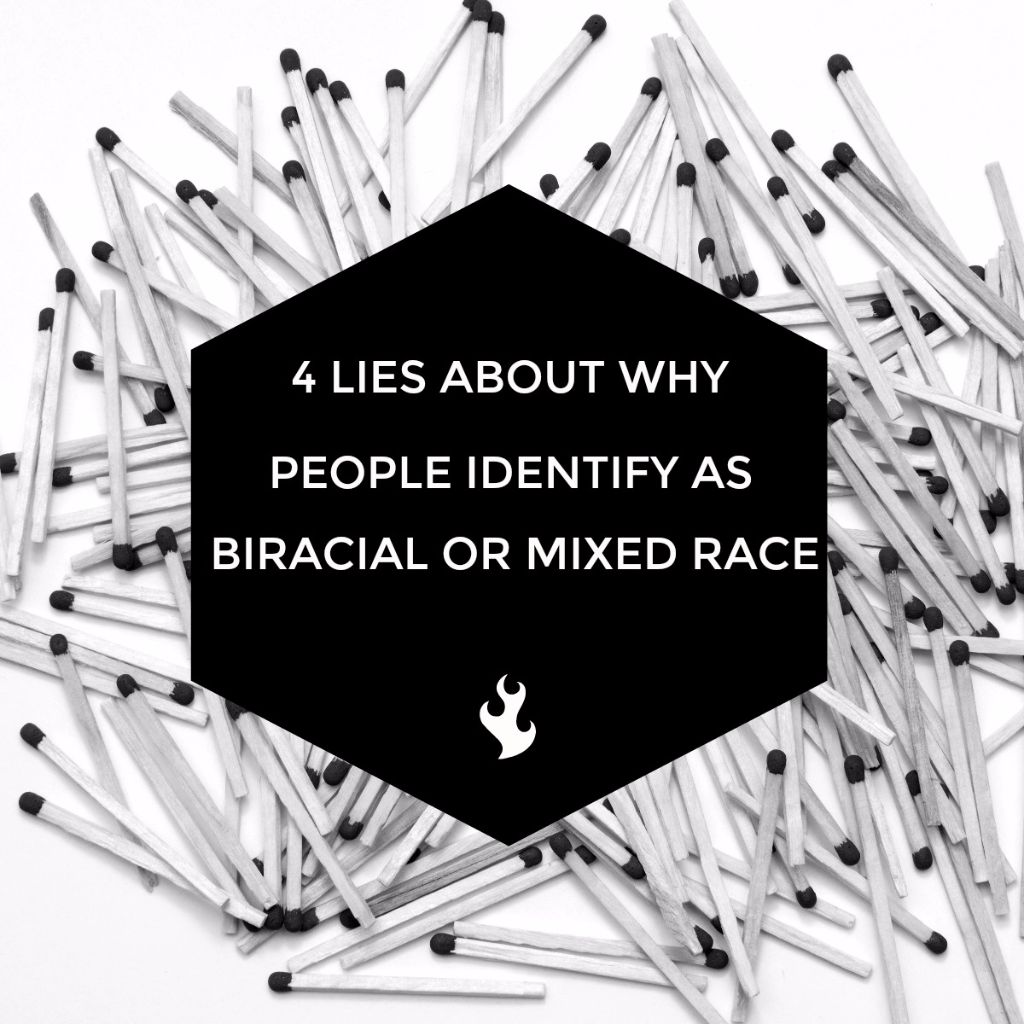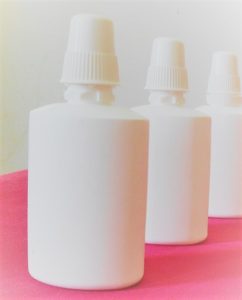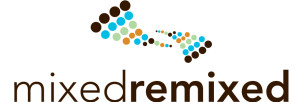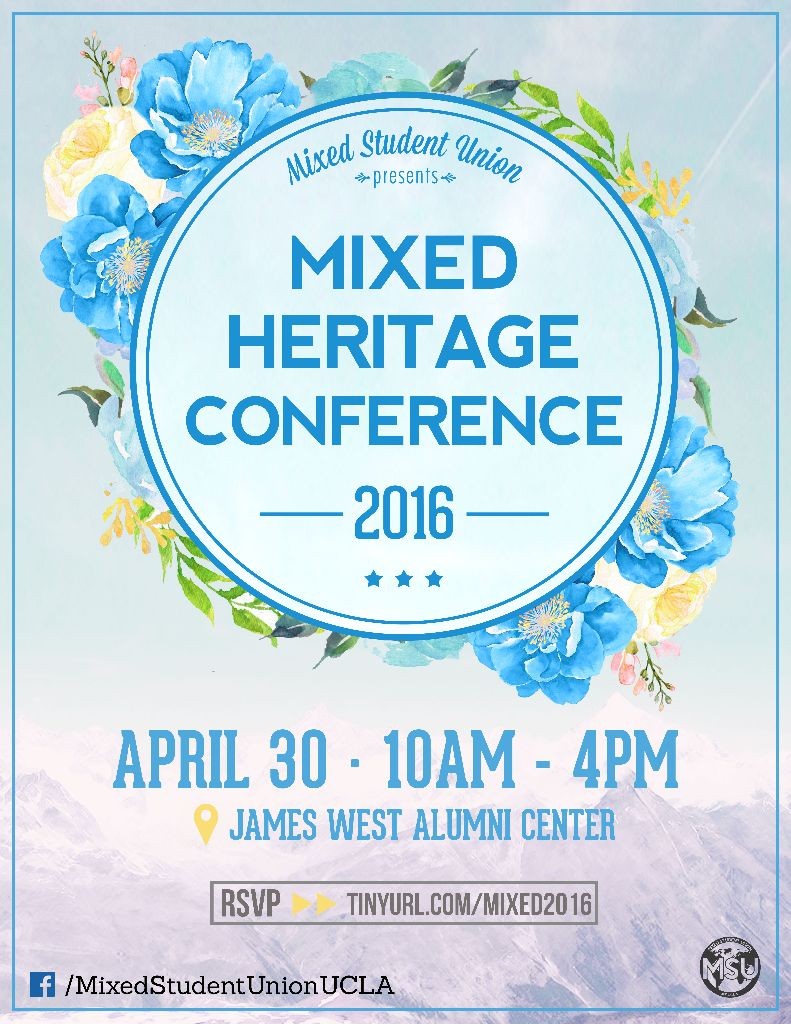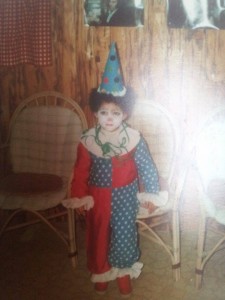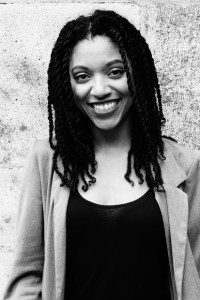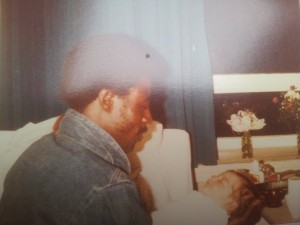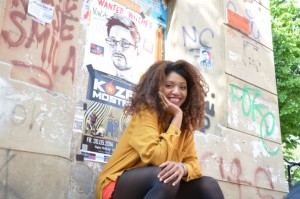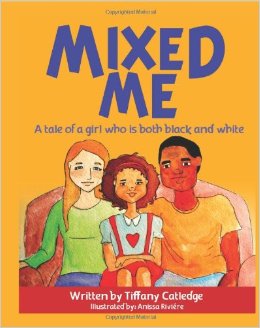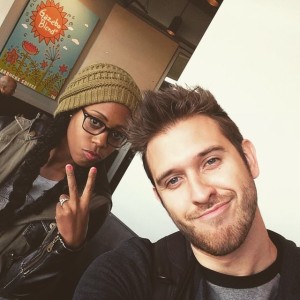5 Things That Will Make You Feel Like You Can Embrace a Mixed Race or Biracial Identity
1. Recognize that your psychic health may require self-acceptance of your mixed race and multiracial identity.
A study published in 2015 in Current Directions in Psychological Science by Sarah Gaither found that multiracial children who are “raised to identify with both parents and to understand their complex racial heritage [can] have higher self-esteem than mono-racial people. They are adaptable, able to function well in both majority and minority environments. They are more likely to reject the conception that race biologically predicts one’s abilities, which may, in turn, insulate them from the negative impact of racism or bias.” Source: New York Magazine.
2. Learn about historical figures who were mixed.
 One of the things that helped me start to accept the fact that I could not hide from my complicated cultural and racial identity was learning about other mixed-race people of the past. For me, Nella Larsen who also wrote about being black and Danish (like me) back in the 1920s became an important figure. I saw her bravery about talking about being mixed in a racially divided world as a kind of permission. It’s important to feel like you have a history. Seek out mixed historical figures. Here’s one fun resource in The Mixed Experience History Month.
One of the things that helped me start to accept the fact that I could not hide from my complicated cultural and racial identity was learning about other mixed-race people of the past. For me, Nella Larsen who also wrote about being black and Danish (like me) back in the 1920s became an important figure. I saw her bravery about talking about being mixed in a racially divided world as a kind of permission. It’s important to feel like you have a history. Seek out mixed historical figures. Here’s one fun resource in The Mixed Experience History Month.3. Read books about biracial people (fiction and non-fiction).
 There is an ever-growing literature about biracial and mixed-race characters and people. Read those stories and find yourself! We have a couple of resources here if you’re looking for memoirs or kids’ books. The Mixed Remixed Festival also has its own on-line book club. You should join us and read some great books!
There is an ever-growing literature about biracial and mixed-race characters and people. Read those stories and find yourself! We have a couple of resources here if you’re looking for memoirs or kids’ books. The Mixed Remixed Festival also has its own on-line book club. You should join us and read some great books!4. Watch films featuring biracial and mixed race characters.
 Ditto films! It’s an amazing experience to be in a theater and see families that look like your own like the wonderful film, Loving, and now more recently A United Kingdom. Heck, you can find our stories on Netflix too. Stream one now!
Ditto films! It’s an amazing experience to be in a theater and see families that look like your own like the wonderful film, Loving, and now more recently A United Kingdom. Heck, you can find our stories on Netflix too. Stream one now! 5. Connect on-line and in-person with other mixed race and biracial people.
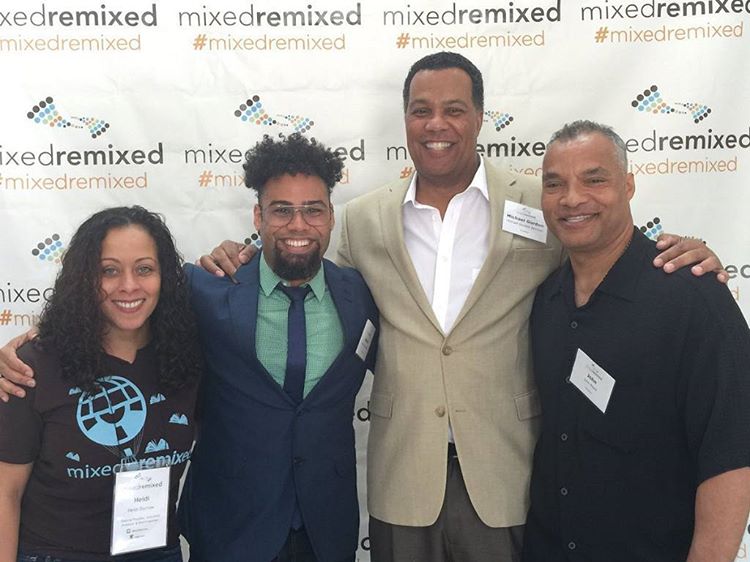 It’s been so amazing to connect with other mixed folks and families on line in various Facebook groups and on Twitter and Instagram. Our favorite way to connect though is the Mixed Remixed Festival. It’s the largest nationwide gathering of mixed families and people held each year in June. You should join us! It’s free!
It’s been so amazing to connect with other mixed folks and families on line in various Facebook groups and on Twitter and Instagram. Our favorite way to connect though is the Mixed Remixed Festival. It’s the largest nationwide gathering of mixed families and people held each year in June. You should join us! It’s free! 3 Clever Tools to Simplify Your Curly Hair Days
3 Clever Tools to Simplify Your Curly Hair Days
Some days I wonder why people use the term “naturally curly” when talking about my hair. I have been in a life-long search to figure out how to make my naturally curly hair look curly. These are some of the tools that have helped me on my curly hair days.
1. Mixed Chicks Hair Products
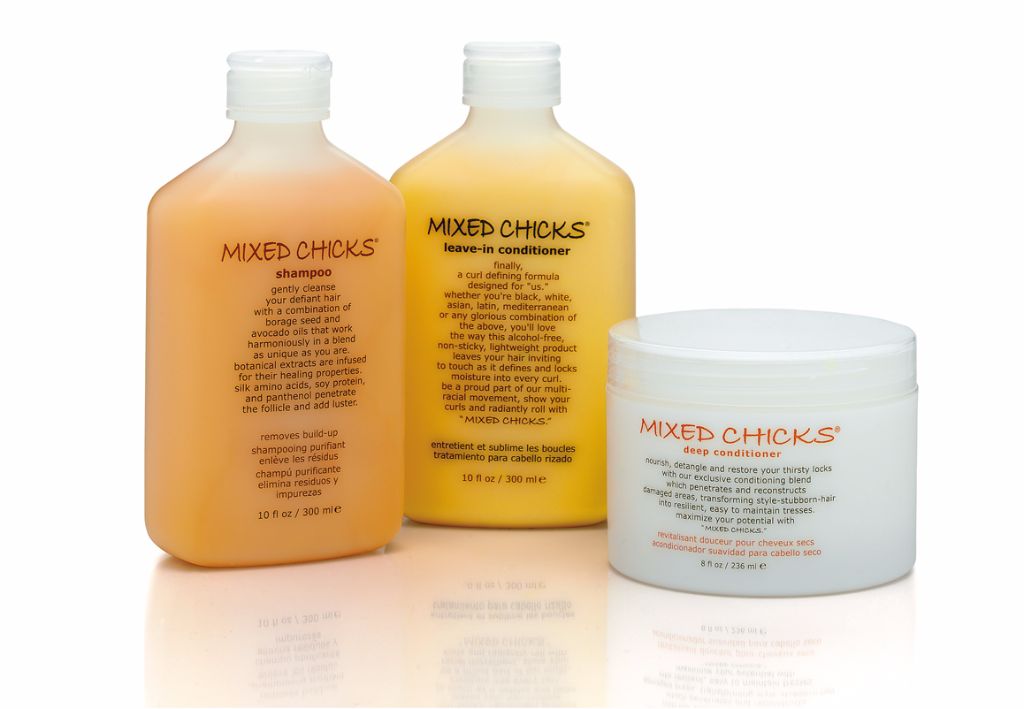 Mixed Chicks Hair Products have worked wonders on my hair. The products define my curls without weighing them down. And the product doesn’t flake off like other products can. My favorite product is the leave-in conditioner, but check out the whole line of shampoos, conditioners, and now hair brushes and hair accessories too!
Mixed Chicks Hair Products have worked wonders on my hair. The products define my curls without weighing them down. And the product doesn’t flake off like other products can. My favorite product is the leave-in conditioner, but check out the whole line of shampoos, conditioners, and now hair brushes and hair accessories too!2. Fast-drying hair towel
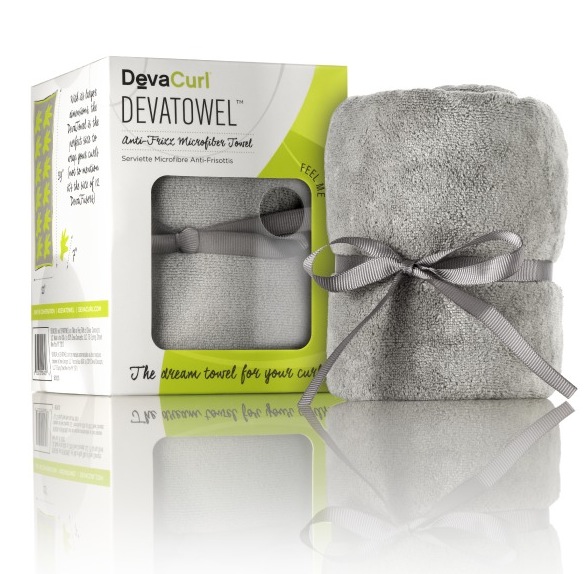 If you have long, thick curly hair, a fast-drying hair towel is a real life saver. In the past, my hair has been damp up to five hours after I’ve washed it. And maybe you too have experienced that ring around the shoulders of a tshirt when your hair was still wet? Your curls will dry happily in a fast-drying hair towel without getting smushed. Try it.
If you have long, thick curly hair, a fast-drying hair towel is a real life saver. In the past, my hair has been damp up to five hours after I’ve washed it. And maybe you too have experienced that ring around the shoulders of a tshirt when your hair was still wet? Your curls will dry happily in a fast-drying hair towel without getting smushed. Try it.
3. Lavender Water in Spray Bottle
Join us for the largest gathering of multiracial and mixed-race families and people in June 2017 for the 4th Annual Mixed Remixed Festival.
Multiracial Folks Celebrate Day at UCLA
Esther Donkor on KrauseLocke “Rough Hair”
The following is an interview, conducted originally in German with mixed chick or as she says, “KrauseLocke,” Esther Donkor of Cologne, Germany! Esther is a published writer who also runs a successful blog called KrauseLocke, which means Curly Hair/Rough Locks! The blog is now quite popular in the natural hair community i n Germany and today, we’re going to talk to Esther about her own biracial story, growing up in a cosmopolitan city, her connection to her father’s native Ghana and what it means to find yourself in 2016. Let’s get right to it!
(At the end, you’ll find a video of Esther on German television)
*MR = Mixed Remixed Interviewer; *ED = Esther Donkor, our interviewee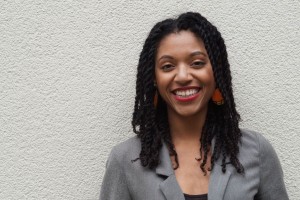
Question 1:
MR: What does it mean to you to be “mixed”? And do you identify yourself as “mixed” or are you not a big fan of this term? (German/Deutsch) Was bedeutet es für dich “Mischling” zu sein? Und identifizierst du dich selber als “Mischling” oder bist du eher kein Fan von diesem Begriff?
ED: I was labeled and labeled myself as “mixed” very early in my childhood and never had a problem with it. My father is black and my mother is white – and this was very clear to me that I was mixed, a Remix of both. My skin colour is “brown and that is a mix of the two. I felt pretty comfortable with that. It was only later, when I started university that I found out about the historical background as to why, one shouldn’t identify as ‘mixed’. I started hearing, “but you’re not a dog!” from all sides that said the term was racist. This led to a mini crisis for me, as I had always felt comfortable and embraced the role “in-between” and now all of a sudden, I had to pick a side. This meant that I actually didn’t have a choice. I should be black. I wrote an article about how torn I felt during this time: http://krauselocke.de/2012/04/kaputte-schublade-eine-kurzgeschichte-von-esther-donkor/ I now avoid identifying myself as “mixed” in the public eye. Instead, I say that I’m a “Krauselocke” (Rough Curl) or just nothing defining. At heart, I’m just a person, standing between the cultures and I enjoy it, too. It means a lot to me and I never want to lose that.
(German/Deutsch)
Seit frühster Kindheit wurde und habe ich mich selbst als „Mischling“ bezeichnet und das nicht weiter schlimm gefunden. Mein Vater ist Schwarz, meine Mutter ist weiß – da war es für mich klar, dass ich eine Mischung bin, ein Remix aus beiden. Meine Hautfarbe ist „braun“ und das ist ein Mix aus beiden. Ich habe mich damit im Grunde wohl gefühlt. Erst später, da ging ich in die Uni, habe ich den geschichtlichen Hintergrund des Wortes gelernt und erfahren, dass man sich selber gar nicht als „Mischling“ bezeichnen sollte. „Du bist doch kein Hund!“, hieß es dann von vielen Seiten und der Begriff sei rassistisch. Das hat mich allerdings in eine kleine Krise getrieben, da ich mich in der Rolle des „Dazwischenstehens“ immer recht wohl gefühlt hatte und jetzt plötzlich eine Seite wählen sollte. Das heißt, eine Wahl blieb mir gar nicht. Schwarz sollte ich ja sein. Ich habe unter anderem in diesem Artikel über diese Zerrissenheit geschrieben: http://krauselocke.de/2012/04/kaputte-schublade-eine-kurzgeschichte-von-esther-donkor/
In der Öffentlichkeit vermeide ich es jetzt mich selbst als „Mischling“ zu bezeichnen. Ich sag dann, ich bin eine Krauselocke oder einfach gar nichts Definierendes. Im Herzen bin ich aber ein Mensch, der zwischen den Kulturen steht und ich genieße es auch. Es bedeutet mir sehr viel und ich will das gar nicht mehr missen.
Question 2:
MR: What’s the true story behind the website, “KrauseLocke,” that you started together with your friend Barbara a few years ago?
Was ist denn die genaue Geschichte hinter der Webseite, “KrauseLocke” die du, zusammen mit deiner Freundin Barbara, vor einigen Jahren eröffnet hast?
ED: KrauseLocke started due to a certain deficit. Not only do Barbara and I, have dark skin that already separates us from the majority in German society. We also have pretty curly hair on our heads. This doesn’t really fit in with our western standards of beauty and the average hairdressers could not and to this day, still can’t do much with our hair. As it relates to hair care, we both had to research on the internet for ourselves, on American or French blogs and YouTube videos. There were virtually no haircare tips for Afro-hair on the internet. We wanted to changed that, and in 2011, we started KrauseLocke – a brand for curly heads and curly thoughts, which has grown into a huge community since then.
KrauseLocke entstand aufgrund einer Mangelsituation. Barbara und ich, wir haben beide nicht nur eine dunkle Hautfarbe, die uns von der deutschen Mehrheitsgesellschaft abgrenzt. Wir haben auch noch ziemlich krause Haare auf dem Kopf. Das passt nicht gerade in unser westliches Schönheitsideal und auch die herkömmlichen Frisöre konnten und können auch heute nicht viel mit unserer Mähne anfangen. Was die Haarpflege anging mussten wir uns im Internet eigenständig schlau machen, auf amerikanischen oder französischen Webseiten und YouTube-Videos. Auf Deutsch gab es so gut wie keine Pflegetipps für Afrohaare im Netz. Das wollten wir ändern und haben 2011 KrauseLocke gegründet – eine Marke für krause Köpfe und krause Gedanken, die sich bis heute zu einer riesigen Community entwickelt hat.
Question 3:
MR: Did you have problems coming to terms with your identity as a little girl; can you tell us a little bit about your childhood – what it was like back then growing up with a German mother and a Ghanian father?
Hattest du als kleines Mädchen Schwierigkeiten mit deiner Identität klar zu kommen; kannst du uns ein bisschen von deiner Kindheit erzählen – wie es damals so war mit einer Deutschen Mutter und einer Ghanaeschen Vater?
ED: Sure, I always looked different and kids would ask questions like, “Why is Esther so dirty?” And later, during puberty, all the boys liked blonde girls or the blonde Beyonce, but not curly-haired Esther. That obviously frustrates you as a young person with raging hormones. Besides, I had never been to Ghana, don’t speak Twi and never had any real connection to Africa. I suffered a lot during this time and definitely embraced the “victim” role. But that’s thankfully behind me, and today I feel extremely comfortable in my skin.
Klar, ich sah immer anders aus und Kinder haben dann so Fragen gestellt, wie: „Warum ist die Esther so dreckig?“. Und später in der Pubertät standen alle Jungs auf Blondinen oder auf die blonde Beyonce, aber nicht auf die kraushaarige Esther. Das macht einen als jungen, hormongesteuerten Menschen natürlich fertig. Außerdem war ich nie in Ghana, spreche kein Twi und hatte auch sonst kaum einen Bezug zu Afrika. Da habe ich schon viel gelitten und mich in ner Opferrolle gesuhlt. Aber das ist zum Glück überwunden und heute fühle ich mich pudelwohl in meiner Haut.
Question 4:
MR: The people of Cologne are definitely known for their open-mindedness, friendliness and welcoming culture – from your own observations, is this truly the case? Or is there in fact a dark side to one of the most beautiful cities in Germany?
Kölner sind ja sehr bekannt für ihre Weltoffenheit, Freundlichkeit und Willkommenskultur – stimmt das, deines Erachtens, wirklich? Oder gibt es tatsächlich eine dunkle Seite zu einer der schönsten Städte Deutschlands?
ED: Cologne is my home. I was born here and also grew up here, I live here and will probably continue living here in the future. As a result, I can neither say anything negative about Cologne nor its people, based on my experience. I just love this city. As of late, I’ve been constantly hearing from people who’ve recently moved here how difficult it is to get settled in Cologne. They implied that the people of Cologne were just fake because we’re always so friendly and nice. And if someone was to say something against our football team, 1. FC Cologne, that with our being friendly would quickly be over. But I think there are worse things than “being too friendly”! I can only say this: Cologne is amazing! There’s so much happening here culturally, which constantly inspires me, as an artist myself. We also have an amazing music scene here – and although the2015/16 New Years Eve incident has casted a shadow over our wonderful city – Cologne is just unbelievably amazing, beautiful and warm! Our general awareness is not only focused on living peacefully with each other but also on acceptance.
Köln ist meine Heimatstadt. Ich bin hier geboren und auch aufgewachsen, ich lebe hier und werde wohl auch in Zukunft weiter hier leben. Von daher kann ich aus meiner Sicht nichts Schlechtes über Köln und seine Bewohner sagen. Ich liebe diese Stadt einfach. Ich höre in letzter Zeit aber immer wieder von Zugezogenen, dass sie es bisweilen schwer haben, in Köln Fuß zu fassen. Die meinen dann, wir Kölner wären nicht ehrlich, weil wir immer so freundlich und nett seien.Und wenn man etwas gegen den 1. FC Köln sagen würde, dann wäre das mit der Freundlichkeit auch ganz schnell vorbei. Aber ich glaube, es gibt Schlimmeres als Nettigkeit! Ich kann nur allen sagen: Köln ist super! Auch kulturell geht hier wahnsinnig viel, was mich als Künstlerin immer wieder inspiriert. Wir haben auch ne wahnsinnig tolle Musikszene hier – und auch wenn die Silvesternacht 2015/16 einen großen Schatten auf unsere schöne Stadt geworfen hat – im Herzen ist Kölle einfach wahnsinnig toll, schön und warm! Unser kollektives Bewusstsein ist auf ein friedliches Miteinander und auch Akzeptanz ausgerichtet.
Question 5:
MR: Have you ever been ashamed of your heritage or skin colour, or wished you were either black or white? Did your parents talk to you about “heritage”often?
Hast du dich jemals wegen deiner Herkunft/Hautfarbe geschämt oder gewünscht du wärst entweder Schwarz oder Weiß? Haben deine Eltern oft mit dir über das Thema “Herkunft” o.Ä gesprochen?
ED: I never wanted to change my skin colour. I even went to a tanning studio to get even dark and to freshen up my Vitamin D stores. 😉 I always liked my skin colour, it was just my hair that I often wanted to change. The curly hair structure was always a problem because I never knew what to do with it. My parents never really spoke to me about “heritage”. I know a lot about my German family, as I was raised by them. I have definitely been very sensitised about German history and that side of my heritage, particularly about the Second World War and the types of conditions my grandparents had to endure. As it relates to my Ghanian heritage, I only know snippets of things and especially now as a grown woman, I try to learn more about it by asking my father very specific questions.
Meine Hautfarbe wollte ich nie ändern. Ich bin sogar mal auf die Sonnenbank gegangen, um noch dunkler zu werden und um meinen Vitamin D Haushalt aufzupeppen. 😉 Also meine Hautfarbe finde ich toll, nur die Haare, die wollte ich oft ändern. Die krause Haarstruktur war immer ein Problem, weil ich nie wusste, was ich damit anfangen soll. Über das Thema Herkunft haben meine Eltern eigentlich gar nicht so mit mir gesprochen. Ich weiß halt viel von meiner deutschen Familie, in der ich aufwuchs. Über den zweiten Weltkrieg und die Umstände, unter denen meine Großeltern leben mussten. Da bin ich sensibilisiert, was die deutsche Geschichte und meine Herkunft angeht. Dinge meiner ghanaischen Familie erfuhr ich nur häppchenweise und erst jetzt als Erwachsene, dadurch dass ich mich mehr damit befasse und meinem Vater gezielte Fragen stelle.
Question 6:
MR: Who was your biggest idol growing up and why – what were you able to learn from this person?
Wer war dein größter Idol als du aufgewachsen bist, und wieso – was hast du von dieser Person lernen können?
ED: Well for me it’s like this, I can’t commit myself to these kind of things. I get inspired almost daily by different people and things. That’s how it’s always been. I didn’t really have a real role model in my childhood. I always met people who inspired me, read a lot and listened to a lot of music. All of these things inspired me. One of my teachers, later inspired me to start writing. My mom always said that I was beautiful and that I could do everything that I want. As a teenager, I found “false” Idols in people like Lil Kim. That was not so nice because all I learned from them was how to be a “Hip-hop bitch,” … but thankfully all of that is over. I also found Joy Denalane to be really cool at one point. But now not so much, as she often served as a judge on casting shows, which I find terrible – to sit on a jury and judge other people’s art. I’m not a fan of turning people into “idols.” I always look at the things that I like, let them inspire me and do my own thing, something that fits me. A remix, simply, which fits in with your platform (Mixed Remixed). ☺
Bei mir ist das so, ich kann mich bei solchen Dingen nicht festlegen. Ich hole mir quasi täglich Inspiration von verschiedenen Menschen und Dingen. Das war schon immer so. Ein wirkliches Idol hatte ich nicht in meiner Kindheit. Ich bin immer wieder Menschen begegnet, die mich inspirierten, habe viel gelesen und Musik gehört. Das hat mich alles inspiriert. Später hat mich dann meine Lehrerin dazu inspiriert zu schreiben. Meine Mom hat immer gesagt, dass ich schön bin und ich alles kann, was ich will. Falsche Vorbilder hatte ich dann in der Pubertät mit Lil Kim und Co. Das war nicht so schön, weil ich von denen gelernt habe, wie man sich wie eine „HipHop Bitch“ gibt…aber das ist alles zum Glück vorbei. Ich fand auch Joy Denalane mal ganz toll. Mittlerweile aber gar nicht mehr, da sie in Castingshow-Jurys saß und ich es total furchtbar finde, sich in Jurys zu setzen und die Kunst anderer Menschen zu bewerten. Ich bin kein großer Fan davon, Menschen zu Idolen zu machen. Ich gucke immer auf die Dinge, die mir gefallen, lasse mich inspirieren und versuche, was Eigenes daraus zu machen, etwas das zu mir passt. Ein Remix halt, passend auch zu eurer Plattform. ☺
Question 7:
MR: How important are platforms like “KrauseLocke” and “MixedRemixed” for young men and women who are desperately searching after their identity, in your opinion?
Wie wichtig sind, deiner Meinung nach, Plattformen wie “KrauseLocke” und auch “MixedRemixed” für junge Männer und Frauen, die verzweifelt nach ihrer Identität suchen?
ED: I see, on a daily basis, how important KrauseLocke is for so many people. They connect with each other and are able to learn so much from each other. For this reason, we adapted the slogan: “For curly heads and curly thoughts”, because we don’t want to exclude anyone, who may not have curly hair and dark skin. At the end of the day, we want to form a togetherness that is based on mutual understanding. And the theme of searching for identity is more present today than ever. It is simply important to get to know yourself and your identity for your own personal development and self-satisfaction.
Tagtäglich sehe ich, wie wichtig KrauseLocke doch für so viele Menschen ist. Die vernetzen sich richtig, tauschen sich aus und man kann wahnsinnig viel voneinander lernen. Wir haben ja auch extra den Slogan: „Für krause Köpfe und krause Gedanken“ etabliert, denn wir wollen niemanden ausschließen, der jetzt keine krausen Haare oder eine dunkle Haut hat. Wir wollen ja ein Miteinander schaffen, etwas, das auf gegenseitigem Verständnis beruht. Und das Thema Identitätssuche ist ja heute präsenter denn je. Es ist einfach ganz wichtig, sich mit sich selbst und seiner Identität auseinanderzusetzen, für die persönliche Entwicklung und das eigenen Wohlergehen.
Question 8:
MR: How have your perspective and opinions changed as it relates to the topic “being mixed”, from your childhood to now?
Wie haben sich deine Perspektiven und Meinungen zum Thema “Mischlingsein” verändert, von deiner Kindheit bis heute?
ED: I had difficulties embracing my differentness in my childhood. Today I celebrate it. It definitely has something to do with individuality and uniqueness. But every person is unique. We can’t forget that.
In der Kindheit konnte ich mit dem Anderssein nicht so gut umgehen. Heute feiere ich es. Das hat ja auch was mit Individualität zu tun und Einzigartigkeit. Aber jeder Mensch ist einzigartig. Das darf man einfach nicht vergessen.
Question 9:
MR: Most see someone and come up with an idea, based solely on someone’s physical appearance. So, please tell us: who “Esther” is and what she believes in this life?
Die meisten Menschen sehen einen und formulieren sofort eine Meinung, was nur auf das äußere Erscheinungsbild eines Menschen bezogen ist. Also, sag du uns mal bitte: wer ist “Esther” und an was glaubt sie in diesem Leben?
ED: That is a really nice question, however the answer will always change with the varying developmental stages in someone’s life. At the moment, I am a person who believe that I’m more than just the dark-skinned body with curly hair that I live in. It only plays a role as it has to be in harmony with my spirit and soul, in order for me to be happy. I believe in inspiration, as I would certainly crumble without it. I want to constantly learn and create new things. I believe that we all have the power to control our own destinies and should make the most of it. We shouldn’t be so quick to point our fingers at others, but reflect on ourselves – because that’s where power is. I believe in love and peace and justice and try not to focus on things that I’m against. I believe in the law of resonance.
Das ist eine ganz schöne Frage, deren Antwort sich natürlich mit den unterschiedlichen Entwicklungsstufen des Menschen immer wieder ändern kann. Im Moment bin ich ein Mensch, der daran glaubt, dass ich mehr bin als der dunkelhäutige, krauselockige Körper, in dem ich stecke. Der spielt nur insofern eine Rolle, als dass ich ihn in Einklang mit meinem Geist und meiner Seele bringen muss, um glücklich zu sein. Ich glaube an Inspiration, ohne sie würde ich zugrunde gehen. Ich will immer wieder neues lernen und kreieren. Ich glaube daran, dass wir alle unser Schicksal selbst steuern können und somit das Zufriedenstellendste aus unserem Leben machen sollten. Wir sollten weniger mit den Fingern auf andere zeigen, sondern viel öfter in uns gehen. Denn da liegt die Kraft. Ich glaube an Liebe und Frieden und Gerechtigkeit und versuche mich nicht auf die Dinge zu fokussieren, die ich ablehne. Ich glaube an das Gesetz der Resonanz.
Question 10:
MR: What is the message that you hoped to get out with your book, Wurzelbehandlung – Deutschland, Ghana und ich (Root Treatment – Germany, Ghana and I); what inspired you to initially release such a book and did you make the point, you hoped to make?
Was ist die Message, die du mit deinem Buch, Wurzelbehandlung – Deutschland, Ghana und ich, weitergeben wolltest; was hat dich erstens bewegt, ein solches Buch zu veröffentlichen und hast du diesen Punkt getroffen, den du treffen wolltest?
ED: I never wanted to release the book. I wanted to make a fictional novel, about a main character who struggles with her identity but later realises that that’s the very thing that was standing in her way. I wrote for about a year on that novel but it didn’t work because it simply wasn’t fiction, it was my own story. That’s why I released “Wurzelbehandlung” as my own story. A root treatment hurts a lot but it has to be done for your own good. On the one hand, I wanted to relieve myself of the self-imposed stress of identity searching and the victim role. On the other hand, I get so many messages from “KrauseLocken” who have similar experiences or even “worse”. For example, a good friend of mine has never met her Ghanian father and he’s already passed away. She lacks that connection to Africa. I wanted to give people a little glimpse and let them travel with me. I especially wanted to draw attention to the level of comfort we enjoy here in Germany, in comparison to some of the conditions I experienced in Ghana. We should stop complaining all the time. We need a mind shift and quick.
Das Buch wollte ich so nie veröffentlichen. Ich wollte daraus einen fiktiven Roman machen, über eine Hauptfigur, die Struggle hat wegen ihrer Identität und am Ende erkennt, dass sie sich damit selbst im Wege stand. Ich habe über ein Jahr an dem Roman geschrieben, aber es hat nicht funktioniert, da es einfach keine Fiktion ist, sondern meine eigene Geschichte. Darum habe ich „Wurzelbehandlung“ als meine Story veröffentlicht. Eine Wurzelbehandlung tut weh, muss aber sein und danach geht’s einem besser. Zum einen wollte ich mich selbst von diesem teilweise selbstauferlegten Ballast der Identitätssuche und der damit einhergehenden Opferrolle lösen. Zum anderen bekomme ich regelmäßig so viele Nachrichten von „Krauselocken“, denen es ähnlich geht, teilweise „schlimmer“. Eine gute Freundin von mir zum Beispiel, hat ihren Vater aus Gambia nie kennengelernt und er ist bereits tot. Ihr fehlt jeglicher Bezug zu Afrika. Mit dem Buch wollte ich diesen Menschen einen kleinen Einblick geben, sie mitreisen lassen. Und vor allem wollte ich darauf aufmerksam machen, in welcher Wohlstandsgesellschaft wir hier in Deutschland leben – im Vergleich zu den Verhältnissen, die ich in Ghana erlebt habe. Wir sollten endlich aufhören, uns immer und immer wieder zu beschweren. Wir sollten umdenken, aber ganz schnell.
[youtube]https://www.youtube.com/watch?v=ihv-DinWDuA[/youtube]
Don’t forget to activate English subtitles in the Settings option on the video!
Thanks for catching up with us on Mixed Remixed and of course, a big thank you to Esther Donkor – vielen lieben Dank!
This interview and article was written by Terri Rogers, find me on YouTube:
https://www.youtube.com/channel/UCou-DtmhXQ6chUqHYz1A6vw
Kids’ books with Mixed-Race & Biracial Characters
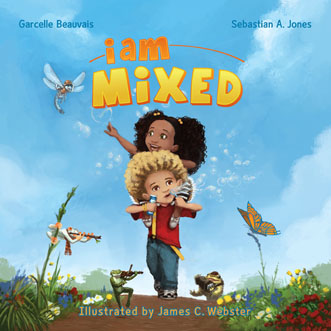 Here’s your chance to grow your kids’ library of books with mixed-race and biracial characters. Contribute to the Mixed Remixed Festival Indiegogo campaign and you will get a copy of I am Mixed by Garcelle Beauvais and Sebastian Jones, Amy Hodgepodge by Kim Wayans and Kevin Knotts, and Mixed Me by Tiffany Catledge.
Here’s your chance to grow your kids’ library of books with mixed-race and biracial characters. Contribute to the Mixed Remixed Festival Indiegogo campaign and you will get a copy of I am Mixed by Garcelle Beauvais and Sebastian Jones, Amy Hodgepodge by Kim Wayans and Kevin Knotts, and Mixed Me by Tiffany Catledge.
You will love these wonderful books that reflect the complexity and the fun of coming from a blended family. Make sure your kids, or nieces and nephews have these books on their bookshelves and support the Mixed Remixed Festival!
To find out what other great perks we have check out our Indiegogo campaign here.
The Nive Nulls: A Chat with YouTube’s Hottest Mixed-Race Multiracial Family!
It’s officially the age of YouTubers – funny vloggers, how-tos and everyday insights! What many are perhaps not as aware of is the booming community of family vloggers who take you through their days and make you feel like you’re hanging out with their cool family.
One family that is truly dominating this market at the moment would be the Nive Nulls of Kansas City!
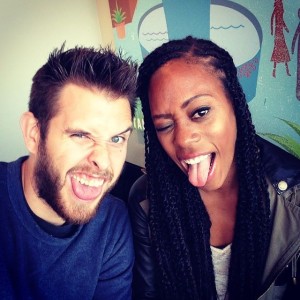
Mixed Remixed had the chance to catch up with the Nive Nulls, where we spoke about race in their relationship, tackling the “What Are You?” question and the beauty of love crossing borders!
Who Are The Nulls?
Well, you have the hilarious Austin, his gorgeously quirky wife Brittany and their two bundles of joy Audrianna and Kailand. And soon they’ll be welcoming a third Null to the bunch! Congrats!
Did we mention they’re a mixed fam?!
The Nive Nulls Interview:
MR:
How would you two describe the relevance or presence of race in your early relationship (as well as now, if applicable)?
NN:
Early on, we definitely talked about race and how it related to our relationship a lot more. We would make more jokes, goof around more and just focus on it a decent amount. Now, we’ve kind of matured our relationship more and we don’t make as big of a deal about the fact that we’re an interracial couple. However, it’s still a part of our life because race relations in general are things that we experience outside of our personal relationship.
MR:
Sidenote: I spied that your FB page is a fan of Love Crosses Borders which is of course awesome! Was either one of you hesitant to spring into an interracial relationship / did you guys even really think about that?
NN:
We love “Love Crosses Borders” on Facebook! They’ve been super supportive of us and always share a lot of our stuff. No, we never thought about [us] as an interracial relationship.We just liked each other’s personality and thought each other were hot. lol
MR:
What would you say you’ve learned about each other and perhaps, people in general, through breaking down color barriers through love?
NN:
We’ve learned to accept the differences we have and embrace them. It also has taught us to just live and not worry about other people’s opinions. If someone is ignorant, it’s their problem and it’s sad for them. It doesn’t affect us.
MR:
How do you feel about the racially charged “What Are You?” question and how do you guys think you’ll advise Kailand and Audri as they get older? (If entertaining that question is even an option)
NN:
I mean, it’s kind of brash way to ask something but it’s not that big of a deal to us. If they ask our kids, we’ll tell them they can say “I’m Kailand” or “I’m Audri” but we also are fine with them answering “I’m biracial and adorable” lol
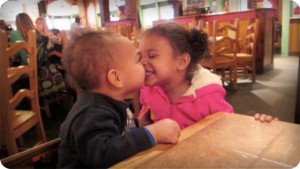
MR:
Your YouTube Channel is one of those few that is almost always free of the cruel YT trolls, how would you describe the continuously loving support of your online Nive Null Family?
NN:
I think it’s because we’re pretty real in our vlogs. We don’t try to put on a front and make our life look SO FUN AND AMAZING AND LOOK AT US ALL DRESSED UP AND PERFECT! We just live. We talk about when we’re down or sad or happy or mad or whatever the case may be. It’s important to be yourself because that’s the only way people will come and stick around.
MR:
Mixed family aside, what do you think separates The Nive Nulls from other Youtube families? (Definitely, NO shade to your YouTube-fam buddies!)
NN:
Haha! Let’s start drama!!! lol jk jk. No, I’d just say it’s probably our personalities. All of the YT families out there have their own unique niche and vibe to their channel. I would describe ours as fun, funny and real. Also, our kids are hilarious and Audri says some of the funniest things I’ve ever heard a human say. lol
Mixed Remixed wishes The Nive Nulls nothing but happiness as they welcome their third baby Null later this year! Check them out on YouTube!
[youtube width=”500″ height=”400″]https://www.youtube.com/watch?v=oKwyg3xEVZg[/youtube]
5 Best Tumblr Blogs for Mixed & Biracial People
1. What We Should Call HAPA (whatweshouldcallhapa)
 This blog is perhaps one of my favorites just because it takes a refreshingly light-hearted approach to relaying the frustrations that come with being biracial or multiracial.
This blog is perhaps one of my favorites just because it takes a refreshingly light-hearted approach to relaying the frustrations that come with being biracial or multiracial.
In a thank you note for reaching 100K subscribers, the author wrote:
“I never thought I’d find so many people who get these jokes and understand what it’s like to be mixed.”
2. F**k Yeah Mixed Beauty (fuckyeahmixedbeauty)
“Exploring what it means to be “mixed” by questioning, redefining ourselves, and celebrating the beauty of multiethnic identities.”
Visiting this blog in particular is always an enriching experience. There are always well-researched stories that deal with mixed people or people of color throughout history scattered around the world – you can find yourself in these stories from decades or even centuries ago and feel a sense of pride in shared multiracial experiences.
3. Iyannwayway
Now this one is a personal blog by a beautiful 21 year old mixie named Lyann who shares her life story as well as those of others through reblogged photos, gifs and article snippets relating to all our mixed up experiences.
“[V]eggie,puerto rican, afro caribbean. Afrocentric. Student. Philosophy. Feel free to talk.
Se habla español.”
4. We Are All Mixed Up (weareallmixedup)
How the 4 moderators describe their site: “This is a blog for those of us who are forgotten in the mainstream anti-racism movement. Those of us who are biracial, multiracial, and multiethnic and have struggled year after year with establishing our identities. This is a safe space for all mixed people of color..
This space encourages stories, submissions, art, poetry, photos, research, links to articles, questions, and whatever else you would like to submit!
We hope to create a space that highlights that not every person of color is monoracial and not every problem we face can be looked at through a monoracial lens.”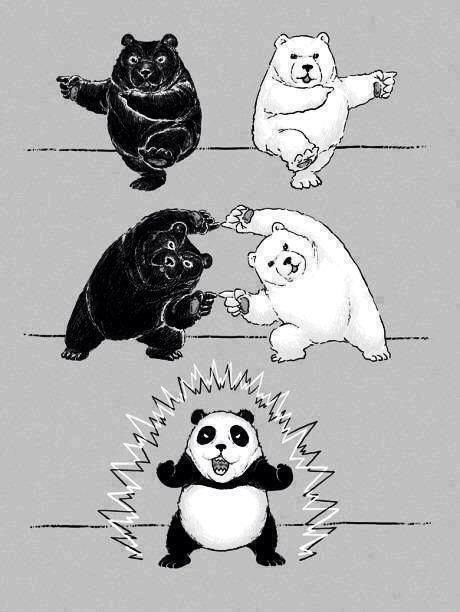
5. Acceptance Is The First Step (acceptance-is-the-first-step)
We love this site. We love our curls! No matter your curl pattern or texture, this site celebrates us all and plainly shows how beautiful diversity truly is!
